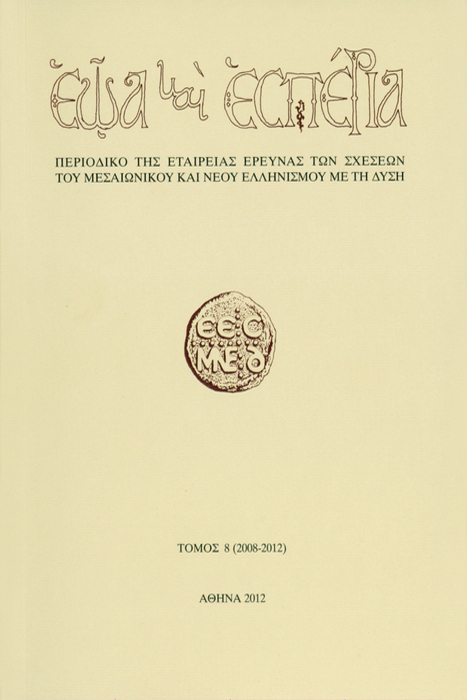ΔΥΤΙΚΟΙ ΚΑΙ ΤΟΥΡΚΟΙ ΠΕΙΡΑΤΕΣ ΣΤΗΝ ΚΥΠΡΟ ΚΑΙ ΤΟΝ ΕΥΡΥΤΕΡΟ ΜΕΣΟΓΕΙΑΚΟ ΧΩΡΟ ΕΠΙ ΦΡΑΓΚΟΚΡΑΤΙΑΣ
Περίληψη
The article examines and discusses the impact of piracy on the Lusignan kingdom of Cyprus. The pirates originated from Western Europe on the one hand, notably the Genoese and Catalans, and on the other from Turkish lands. The relations of the Lusignan kingdom with the pirates changed over the course of the centuries. References to piracy in the waters around Cyprus in the thirteenth century are largely confined to the acts of the synods of the island’s Latin Church. From the fourteenth century onwards, however, measures with a view to combating piracy, especially that practiced by Turkish marauders based on the emirates along the Eastern Aegean littoral, are recorded, especially under King Hugh IV (1324-1359) and his successor, King Peter I (1359-1369). These efforts culminated in the formation of naval leagues in the first half of the fourteenth century between Venice, the papacy, the Hospitallers of Rhodes, as well as Byzantium and Cyprus occasionally, in order to combat Turkish piracy. The capture of Smyrna in 1344, held by the Latins until 1402, was the crowning success of their operations.
Following its defeat by Genoa in the war of 1373-1374, however, Lusignan Cyprus was not in a position to combat piracy anymore, becoming instead a haven for Catalan pirates who systematically raided the coasts of Mamluk Egypt and Syria. The Mamluk invasion of Cyprus in 1426, leading to the defeat and further impoverishment of the kingdom, put a stop to such raids from Lusignan Cyprus, although Genoese-occupied Famagusta continued to provide facilities for Catalan pirates who raided the coastal areas of Egypt and Syria. Instead, the enfeebled kingdom of Cyprus became a victim of the systematic depredations of Turkish pirates operating chiefly from the emirate of Karaman. At the end of the Lusignan period, following the civil war between Queen Charlotte and her illegitimate half-brother James, who by the year 1464 had emerged victorious, Catalan pirates who had supported James’ cause became prominent officers of state until they were displaced and exiled by the Venetians, following the death of James and the Venetian annexation of Cyprus in 1473.
Λεπτομέρειες άρθρου
- Πώς να δημιουργήσετε Αναφορές
-
ΚΟΥΡΕΑΣ Ν. (2013). ΔΥΤΙΚΟΙ ΚΑΙ ΤΟΥΡΚΟΙ ΠΕΙΡΑΤΕΣ ΣΤΗΝ ΚΥΠΡΟ ΚΑΙ ΤΟΝ ΕΥΡΥΤΕΡΟ ΜΕΣΟΓΕΙΑΚΟ ΧΩΡΟ ΕΠΙ ΦΡΑΓΚΟΚΡΑΤΙΑΣ. Ἑῶα καὶ Ἑσπέρια, 8, 85–112. https://doi.org/10.12681/eoaesperia.12
- Τεύχος
- Τόμ. 8 (2012)
- Ενότητα
- Άρθρα
Οι συγγραφείς των άρθρων που δημοσιεύονται στα Ἑῷα καὶ Ἑσπέρια διατηρούν τα δικαιώματα πνευματικής ιδιοκτησίας επί των άρθρων τους, δίνοντας στο περιοδικό το δικαίωμα της πρώτης δημοσίευσης. Άρθρα που δημοσιεύονται στα Ἑῷα καὶ Ἑσπέρια μπορούν να χρησιμοποιούνται ελεύθερα, χωρίς δικαίωμα τροποποίησης (δημιουργία παράγωγου έργου) με αναφορά στον/στη συγγραφέα και στην πρώτη δημοσίευση για μη κερδοσκοπικούς σκοπούς. Η Εταιρεία Έρευνας των Σχέσεων του Μεσαιωνικού και Νέου Ελληνισμού με τη Δύση διατηρεί το δικαίωμα να δημοσιεύει, να αναπαραγάγει, να παρουσιάζει στο κοινό, να διανέμει και χρησιμοποιεί άρθρα που δημοσιεύονται στα Ἑῷα καὶ Ἑσπέρια σε οποιοδήποτε μέσο και μορφή είτε μεμονωμένα είτε ως μέρη συλλογικών έργων, για όλο τον χρόνο διάρκειας προστασίας της πνευματικής ιδιοκτησίας και για όλες τις χώρες του κόσμου. Αυτό περιλαμβάνει ενδεικτικά και όχι αποκλειστικά το δικαίωμα δημοσίευσης των άρθρων σε τεύχη του περιοδικού Ἑῷα καὶ Ἑσπέρια, αναπαραγωγής και διανομής μεμονωμένων αντιγράφων των άρθρων, αναπαραγωγής ολόκληρων των άρθρων σε άλλη έκδοση της Εταιρείας Έρευνας των Σχέσεων του Μεσαιωνικού και Νέου Ελληνισμού με τη Δύση, καθώς και αναπαραγωγής και διανομής των άρθρων ή περίληψης αυτών με χρήση πληροφορικού συστήματος αποθετηρίου.



